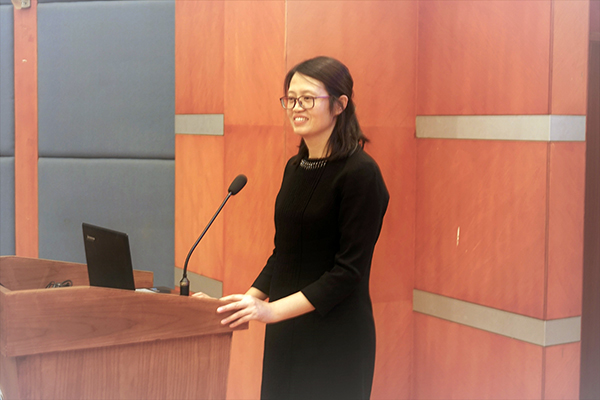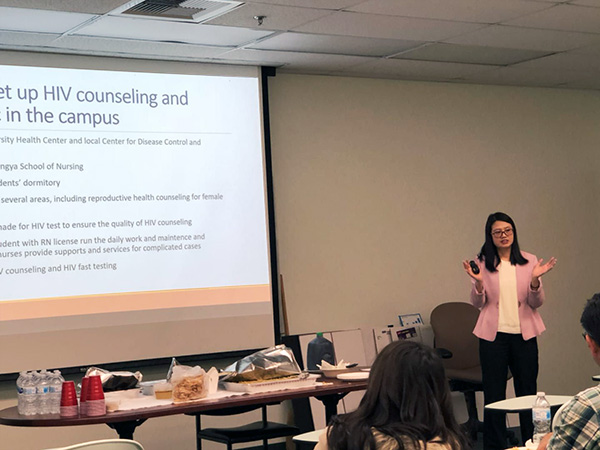Honghong Wang
PhD, MSN, ASN, Professor, Nursing • Xiangya College of Nursing, Central South University, Changsha, ChinaHonghong Wang has worked on HIV prevention and care since the beginning of HIV epidemic in China in the mid-1990s, focusing on four areas.
 First is HIV/AIDS training for nurses in China. She has worked with colleagues from Yale University to conduct HIV/AIDS education programs for health-care workers across China with international AIDS funds.
First is HIV/AIDS training for nurses in China. She has worked with colleagues from Yale University to conduct HIV/AIDS education programs for health-care workers across China with international AIDS funds.
With support from the China AIDS Global Fund, Honghong conducted educational interventions to reduce risk for occupational exposure to HIV among Chinese nursing students. From these studies, a train-the-trainer model was validated as a HIV/AIDS training method among Chinese health-care workers, and evaluation tools for HIV training were developed.
 The second area of focus is research on medication adherence with people living with HIV. Since 2005, Honghong has conducted a number of studies to describe the prevalence and correlation of Anti-retroviral Therapy, ART, adherence among patients at China CARES sites. A culturally appropriate intervention for supporting ART adherence in South Central China had been examined with NIMH-funded research.
The second area of focus is research on medication adherence with people living with HIV. Since 2005, Honghong has conducted a number of studies to describe the prevalence and correlation of Anti-retroviral Therapy, ART, adherence among patients at China CARES sites. A culturally appropriate intervention for supporting ART adherence in South Central China had been examined with NIMH-funded research.
With support funds from China, other intervention methods such as home visits, phone call support, and short message intervention have been explored to improve medication behavior in Chinese HIV-infected people, including IV drug users.
 The third area of focus is research on HIV-related stigma and discrimination. Two government-funded projects were received to explore perceived stigma and discrimination in PLWH in China.
The third area of focus is research on HIV-related stigma and discrimination. Two government-funded projects were received to explore perceived stigma and discrimination in PLWH in China.
Assessment tool fitting to Chinese culture was developed by her team and programs to reduce HIV-related stigma have been designed and implemented including participatory training for medical students and family intervention for PLWH.
The fourth area is working with ethical experts from Yale University and grant supports from NIH, where Honghong led the pioneering work on research, training, practice on nursing ethics in China. She led a team of nursing faculty to develop nursing curriculum on ethical training on research and practice for graduate and doctoral nursing students, under the supervision of Yale colleagues.
They started to organize ethical review work and facilitate responsible research conducted by nursing faculty and students in Xiangya, and the institution review committee at the Xiangya School of Nursing of Central South University was approved by the Office for Human Research Protections (OHRP) in the U.S.
 Besides her domestic work, Honghong is actively engaged in global health collaboration with colleagues from Narobi University of Kenya and Kamuzu College of Nursing and the University of Malawi, and has developed programs on prevention of mother to child transmission (PTMCT) of HIV and maternal and child health.
Besides her domestic work, Honghong is actively engaged in global health collaboration with colleagues from Narobi University of Kenya and Kamuzu College of Nursing and the University of Malawi, and has developed programs on prevention of mother to child transmission (PTMCT) of HIV and maternal and child health.
She also serves as a mentor for six master and doctoral students from developing countries, including Ethiopia, Kenya, Malawi, and Syria, and is instructing them designing thesis projects and conducting global health projects in their home countries.
– Deb
Honghong Wang has worked on HIV prevention and care since the beginning of HIV epidemic in China in the mid-1990s, focusing on four areas.

First is HIV/AIDS training for nurses in China. She has worked with colleagues from Yale University to conduct HIV/AIDS education programs for health-care workers across China with international AIDS funds.
With support from the China AIDS Global Fund, Honghong conducted educational interventions to reduce risk for occupational exposure to HIV among Chinese nursing students. From these studies, a train-the-trainer model was validated as a HIV/AIDS training method among Chinese health-care workers, and evaluation tools for HIV training were developed.

The second area of focus is research on medication adherence with people living with HIV. Since 2005, Honghong has conducted a number of studies to describe the prevalence and correlation of Anti-retroviral Therapy, ART, adherence among patients at China CARES sites. A culturally appropriate intervention for supporting ART adherence in South Central China had been examined with NIMH-funded research.
With support funds from China, other intervention methods such as home visits, phone call support, and short message intervention have been explored to improve medication behavior in Chinese HIV-infected people, including IV drug users.

The third area of focus is research on HIV-related stigma and discrimination. Two government-funded projects were received to explore perceived stigma and discrimination in PLWH in China.
Assessment tool fitting to Chinese culture was developed by her team and programs to reduce HIV-related stigma have been designed and implemented including participatory training for medical students and family intervention for PLWH.
The fourth area is working with ethical experts from Yale University and grant supports from NIH, where Honghong led the pioneering work on research, training, practice on nursing ethics in China. She led a team of nursing faculty to develop nursing curriculum on ethical training on research and practice for graduate and doctoral nursing students, under the supervision of Yale colleagues.
They started to organize ethical review work and facilitate responsible research conducted by nursing faculty and students in Xiangya, and the institution review committee at the Xiangya School of Nursing of Central South University was approved by the Office for Human Research Protections (OHRP) in the U.S.

Besides her domestic work, Honghong is actively engaged in global health collaboration with colleagues from Narobi University of Kenya and Kamuzu College of Nursing and the University of Malawi, and has developed programs on prevention of mother to child transmission (PTMCT) of HIV and maternal and child health.
She also serves as a mentor for six master and doctoral students from developing countries, including Ethiopia, Kenya, Malawi, and Syria, and is instructing them designing thesis projects and conducting global health projects in their home countries.
– Deb
